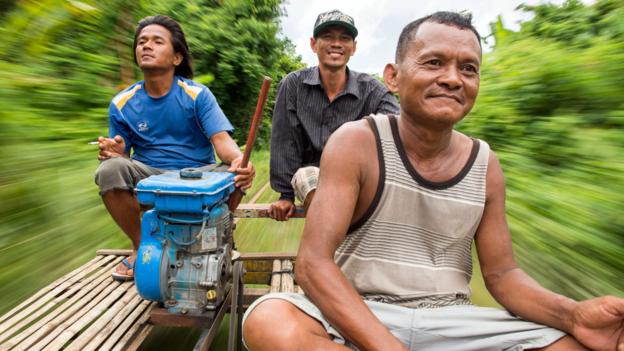
The motor choked twice, then issued a full-throated roar. Our driver Vanny’s relief showed around the edges of his constant smile. He steered us away from O Dambong Station with its roaming poultry and lounging drivers. We moved faster until the air was an oven blast of hot wind; banana trees and coconut palms became a green blur. We sailed above the warping railroad tracks, slowing to cross ramshackle bridges. Kids reached out for high-fives as we passed.
We were on Cambodia’s Bamboo Train: a monument to human ingenuity in a time of necessity and to entrepreneurship in a time of tourism. And we were possibly among its final passengers. The bamboo train’s prophesied demise has become like the story of Bigfoot – famous, unverifiable, and to cynics, improbable. It has circulated since 2006, when a project was unveiled to restore Cambodia’s rail system.
The bamboo train’s prophesied demise has become like the story of Bigfoot.
Years of delay followed, caused by budget issues and a controversial resettlement programme. The country’s southern line from Phnom Penh to Sihanoukville was completed in 2013. But international funding waned, and many believed that plans for the northern line, where the Bamboo Train runs, would be quietly shelved.
“Can we go further?” I asked as we pulled into O Sra Lau Station, the turn-around for our ride. Our driver, Vanny, never stopped smiling, even to deliver bad news. The next stretch of track was too decrepit for our bamboo cart to handle. But he suggested a bright side: there was Coca Cola at O Sra Lau.
Cambodia’s national railroad was abandoned in the 1970s during the civil war and infamous Khmer Rouge years. Trains started running again in the 1980s, but persistent guerrilla fighting left the country’s infrastructure in ruins. Local roads were deplorable, and many communities became isolated as train service diminished and finally died.
The Bamboo Train was a grassroots solution. Wooden platforms, called norries, were built from materials on hand and driven down the overgrown rail tracks using poles, like gondolas. They carried everything: people, produce, goods for trade. Engines were added in the 1990s, powering the carts with a rubber belt around the back axle.
But norries have been dying a natural death. While roads have improved, the train tracks continue to decay. Now Cambodia’s highways are crammed with motorbikes and cars, and all that’s left of the Bamboo Train is a 7km scrap of track outside the city of Battambang. It is maintained as a carnival ride for tourists; a piece of history still struggling for relevance.
The ruined platform of O Sra Lau Station was covered with makeshift stands selling cold drinks and elephant-print trousers. We sat with Darren and Paul, travellers from Glasgow. They’d visited Cambodia before, but this was their first time on the Bamboo Train. Instead of sitting on the cushions, they decided to ride face-first on their stomachs. Norries skim the broken tracks at 30kmph. The tooth-chomping bumps can be exhilarating.
“Probably not safe,” Darren said judiciously, “but pretty cool.”
They finished their drinks and returned to their norry. We watched them bodyboard past, inches off the bucking rails.
The Bamboo Train elicits mixed feelings among travellers. It’s a tourist draw, but that doesn’t necessarily undermine the ride. On the way back to O Dambong, the start and end point of the route, we encountered a norry coming toward us on the single track. A quick head count – four on our cart, five on theirs – and we climbed off to let them through. Vanny moved our bamboo platform off the rails, then dropped the wheels and axels in the grass beside it.
When the other cart had rolled past, the driver hopped off to help Vanny rebuild our norry. While we waited, we chatted with the delighted Slovenian passengers. They loved the views, the jolts, even the relentless sun.
“This is crazy!” one woman yelled as they revved away.
Last July, the government announced plans to rebuild the national rail’s 386km northern line between Phnom Penh and the Thai border. According to Sok-Tharath Chreung, deputy director of the railway department, the first priority is to restore service from the border to Sisophon, the nearest station to Angkor Wat. After that, plans call for rejuvenating the rest of the line.
The Bamboo Train will end whenever the workmen reach O Dambong Station. The vendors around O Sra Lau and O Dambong won’t just lose their customers but probably their stands – a 3.5m corridor must be cleared on either side of the track. No one can give an exact date, but it won’t be long: Chreung expects to have freight trains rolling by 2017.
At O Dambong, we met Visal Daid, who builds norries and drives them when business is slow. He took us through the process, from assembling the frame to cutting bamboo slats for the seating platform. Finished norries, including the engine and wheels, can cost up to 1,600,000 riel – several months salary for the average driver – though the engine can also be used to power sidelines, like a sugar cane juicer.
I asked Daid if he was worried business will flag after the Bamboo Train closes. He shrugged; there’s always work for carpenters.
But most drivers don’t have another trade. Vanny offered to show us his home. It was just off the tracks near O Dambong Station, a tarp and bamboo extension off a relative’s house. He’s been a norry driver for 10 years, and when the Bamboo Train stops he’ll look for work elsewhere, maybe in Thailand.
A group of drivers have petitioned the local government to keep the Bamboo Train alive. Sinnara Mak, deputy director of Battambang’s tourism department, thinks that’s unlikely. When the track is fully restored, trains will run at 50kmph. Having norries on the same track would be dangerous, to say the least. Mak told me some private companies are looking to move the Bamboo Train to its own 15km-long track. But he warned not to count on it: a specialised track would be very expensive, and the land would have to be purchased from farmers.
For the moment, the Bamboo Train will continue to carry travellers on the clattery journey from O Dambong to O Sra Lau. It will ride the rails right up until it stops.
If you liked this story, sign up for the weekly bbc.com features newsletter, called “If You Only Read 6 Things This Week”. A handpicked selection of stories from BBC Future, Earth, Culture, Capital, Travel and Autos, delivered to your inbox every Friday.










